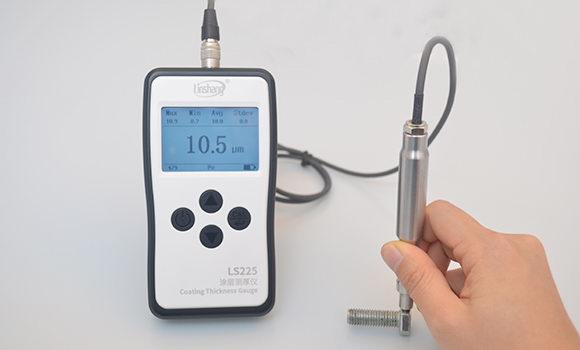Plating Thickness Gauge | Measuring Coating Thickness
Plating thickness testing instrument is especially used to test the plating thickness. Compared to the common coating, the plating thickness is usually thinner, so people have higher requirements for the plating thickness. Linshang LS200+F500 plating thickness gauge is a high precision plating thickness testing instrument and supports five point calibration. If you have high accuracy requirements about the plating thickness, LS225+F500 plating thickness gauge would be your best choice.
1. What is the coating thickness?
The thickness of the plating layer is actually the surface covering layer. In order to make the surface of the material have a certain degree of strengthening, protection (such as oxidation and corrosion protection) decoration or special functions (such as electrical conduction, insulation, invisibility, etc.), using electroplating and electroless plating and other methods to form layers on the surface of a metal or non-metal substrate with a certain thickness.
The cover layer includes a coating layer, a non-metallic coating, a cladding layer, a chemically generated film to apply a cover layer to the material surface to achieve the special function and performance of the material.
2. Significance of plating thickness testing
Plating is actually a metal-based composite material, which means that a thin layer of this precious metal is plated on the common metal surface in order to store or look better with a layer of plastic. The production of a composite plating layer refers to a process in which one or more insoluble solid particles are added to a plating solution. The solid particles and metal ions are deposited together.
In industrial production, if the cover layer thickness is too thin, it will be difficult to exert the special functions and performance of the material. If the plating thickness is too thick, it will cause economic waste. The cover layer thickness is uneven or does not meet the required requirements. Therefore, the thickness uniformity of the surface cover layer is one of the most important product quality indicators.
Plating thickness testing of materials has become the most important process necessary for the material processing industry and users to perform product quality testing. It is an essential means for products to reach high quality standards.
3. Coating thickness measurement method
The country has clear requirements for the metal coating thickness, we must use metal plating thickness gauges to measure the coating thickness. Linshang LS225+F500 plating thickness gauge can be used to measure the thickness of various coating on the metal substrates. For the measurement of layer thickness, the metal plating thickness gauge uses the non-destructive measurement principle of magnetic thickness measurement method and eddy current thickness measurement method, which will not cause damage to the metal coating surface when measuring the coating surface.
LS2205 Plating Thickness Gauge
The LS225+F500 plating thickness gauge is a high-precision plating thickness testing instrument, which combines the Hall effect and eddy current thickness measurement principles. It can be used for plating thickness on various metal substrates. There are only four types of ferromagnetic metal elements at room temperature: iron, cobalt, nickel and thorium. Common non-ferromagnetic metals: copper, aluminum, magnesium, zinc, chromium, etc. Hall effect: It can be used for the measurement of non-ferromagnetic coatings on ferromagnetic metal substrates. Eddy current: the eddy current thickness gauge can be used for the measurement of non-conductive coatings on non-magnetic metal substrates. It's professionally used to detect all kinds of non-ferromagnetic metal plating on ferromagnetic metal substrates such as steel. Except for the plating thickness gauge, Linshang Technology has also developed many other models of coating thickness gauges which use eddy current and Hall effect. Linshang coating thickness gauge can test materials on metal substrates.
Hall effect: It can be used for the measurement of non-ferromagnetic coatings on ferromagnetic metal substrates.
Eddy current: the eddy current thickness gauge can be used for the measurement of non-conductive coatings on non-magnetic metal substrates.
Want to know more information about coating thickness gauge selection, please refer to "Coating Thickness Gauge Selection and FAQ".
- High precision coating thickness gauge for used car
- Automotive paint protection films coating thickness gauge
- Plating Thickness Measuring Instrument for Detecting Anti-corrosion Coating
- Linshang LS220, LS191, LS160A– Necessary for Car Cover Inspection
- Coating Thickness Gauge for Second Hand Vehicle
- Zero Adjustment Step of Coating Thickness Gauge
